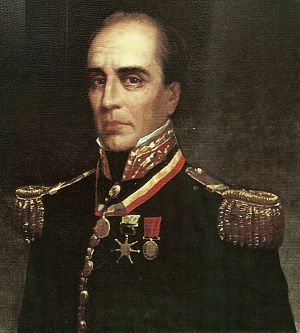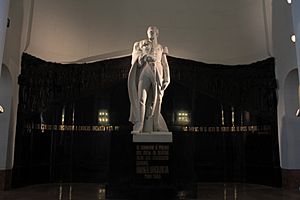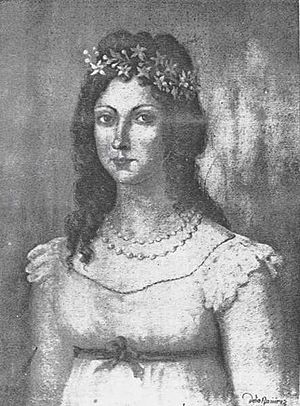Rafael Urdaneta facts for kids
Quick facts for kids
Rafael Urdaneta
|
|
|---|---|
 |
|
| 9th Venezuelan Minister of Defense | |
| In office 1839–1845 |
|
| President | José Antonio Páez (1839–1843), Carlos Soublette (1843–1847) |
| Preceded by | Guillermo Smith |
| Succeeded by | Francisco Mejía |
| 4th President of Gran Colombia | |
| In office September 5, 1830 – May 2, 1831 |
|
| Preceded by | Joaquín Mosquera |
| Succeeded by | Domingo Caycedo |
| 5th Colombian Minister of Defense | |
| In office 1828–1829 |
|
| President | Simón Bolívar |
| Preceded by | Carlos Soublette |
| Succeeded by | Carlos Soublette |
| Personal details | |
| Born |
Rafael José Urdaneta y Farías
24 October 1788 Maracaibo, Captaincy General of Venezuela, Spanish Empire |
| Died | 23 August 1845 (aged 56) Paris, France |
| Spouse | Dolores Vargas París (1822—1845) |
| Children | Rafael Guillermo Urdaneta Vargas Luciano Urdaneta Vargas Octaviano Urdaneta Vargas Adolfo Urdaneta Vargas Eleázar Urdaneta Vargas Nephtalí Urdaneta Vargas Amenodoro Urdaneta Vargas Susana Urdaneta Vargas Rosa Margarita Urdaneta Vargas María Dolores Urdaneta Vargas Rodolfo Urdaneta Vargas |
| Military service | |
| Allegiance | |
| Rank | General |
Rafael José Urdaneta y Farías (October 24, 1788 – August 23, 1845) was a Venezuelan General and a hero of the Spanish American wars of independence. He served as President of Gran Colombia from 1830 to 1831. Urdaneta was a strong supporter of Simón Bolívar. He was one of Bolívar's most trusted and loyal friends.
Rafael Urdaneta's Life
Rafael Urdaneta was born in Maracaibo, Captaincy General of Venezuela. This was on October 24, 1788. His family was important and had Spanish roots. His parents were Miguel Jerónimo de Urdaneta y Troconis and María Alejandrina de Farías. He started school in Maracaibo. Later, he continued his education in Caracas. Before the war for independence, he studied Latin and philosophy.
He married Dolores Vargas París on August 31, 1822. She was a young woman from Santa Fe, Gran Colombia. Their marriage was very popular. This was especially true before Gran Colombia broke apart in 1831.
After Gran Colombia dissolved, they faced difficulties. They had to leave the country. When they reached Maracaibo, Venezuela, they were still in danger. General Páez was against Bolívar's ideas. Urdaneta and Dolores supported Bolívar. So, they had to flee again, this time to Curaçao.
In 1832, they could return to Caracas. The Venezuelan government allowed it. But Urdaneta was not allowed to get involved in politics. The family moved to Santa Ana de Coro. A revolt started there against the government. This allowed Urdaneta to enter politics again. He eventually became a senator until 1845.
In 1845, he was chosen to represent Venezuela in Spain. He was to be an Envoy. But he died in Paris, France, on August 23, 1845. He passed away from kidney stone problems. He never reached Spain.
Urdaneta's body was moved to the National Pantheon of Venezuela. This happened on May 16, 1876. In 2015, October 24 became a national holiday in Venezuela. This day celebrates his memory.
Military Career and Achievements
Urdaneta moved to Santa Fe in 1804. His uncle, Martín de Urdaneta y Troconis, encouraged him. His uncle worked there as an accountant. Rafael wanted to continue his studies. He lived in Santa Fe for several years. There, he gained experience in military administration.
On July 20, 1810, a new government was formed in Santa Fe. This was part of many independence movements. Urdaneta joined this movement. He became a lieutenant in the patriot army. This was on November 1, 1810. The next year, he fought in the Campaña del Sur. After the Battle of Santa Fe in 1813, he was captured. He was held prisoner for a few months. Then, he was set free.
The Admirable Campaign
Simón Bolívar had been forced out of Venezuela. This happened after the first republic failed in 1811. But by 1813, Bolívar was fighting in New Granada. This is when Urdaneta joined Bolívar's army. Bolívar's Admirable Campaign was very important for Urdaneta. He showed great skill under Colonel José Félix Ribas. This was on July 2, 1813, at the Battle of Niquitao. He also helped the patriots win the Battle of Taguanes.
After the patriot victory, Bolívar praised Urdaneta. He told the New Granada Congress that Urdaneta was "worthy of recommendation." He said Urdaneta deserved "all esteem from the government." This was for his bravery and intelligence.
From then on, Urdaneta led many military actions. Some important ones include:
- The Battle of Barbula
- The Retreat to the East
- The Siege of Santa Fe
- The Capture of Maracaibo
- The March to San Carlos in 1821
This march freed the Province of Coro. It also prepared the way for the Battle of Carabobo. Urdaneta did not fight in the Battle of Carabobo. Bolívar felt his troops were too tired. Bolívar asked for Urdaneta to be promoted to General Officer.
After the Battle of Carabobo in 1821, Venezuela was independent. Urdaneta had served the cause for years. He became one of Bolívar's closest friends and helpers.
Political Challenges and Loyalty
In 1828, Urdaneta was the Minister of War. He was also leading the Cabinet. He was in charge of looking into a plot against Bolívar. This was called the September Conspiracy. Some people tried to harm Bolívar, who was president of Gran Colombia. Urdaneta believed Francisco de Paula Santander was behind the plot. Urdaneta and most ministers wanted to punish him severely. Bolívar was worried about the country's stability. So, he sent Santander away for life instead.
These kinds of disagreements caused problems. The death of Antonio José de Sucre in 1830 also hurt the union. These events led to Gran Colombia breaking apart. The union Bolívar had worked so hard for did not last.
Throughout his life, Urdaneta also served as Chief of Army Staff. He was also Minister of War and Navy. Bolívar called him "El Brillante" ("The Brilliant"). This was because of his smart battle plans. This name is still used for him in Venezuelan history. He is known as "the most loyal of loyals to Bolívar."
Presidency of Gran Colombia

In 1830, tensions grew between people from New Granada and Venezuela. A Venezuelan army group, loyal to Bolívar, was in Bogotá. Another group, loyal to General Francisco de Paula Santander, was also there. This group convinced the government to move Bolívar's loyal soldiers. This caused anger among Venezuelans in Bogotá. It led to a fight between the two army groups.
Bolívar's loyal soldiers won. President Joaquín Mosquera y Arboleda and Vice President Domingo Caycedo y Sanz de Santamaría left the capital. On September 5, 1830, General Urdaneta became president. He was called "Provisional Chief of the Government of the Republic of Colombia." Urdaneta and his allies hoped Bolívar would return. They wanted him to be president again. Bolívar had resigned in May of that year.
It became clear that Bolívar would not return. Urdaneta wanted to bring back peace. He ordered Congress to meet on June 15, 1831. This meeting was to be in Villa de Leyva.
However, before Congress could meet, other generals were unhappy. Generals José María Obando and José Hilario López took control of southern New Granada. General José Salvador Córdova Muñoz took control of the northern states. On April 14, 1831, these armies declared Caycedo the rightful leader. They asked General Urdaneta to talk about peace. Urdaneta agreed. He met the generals in Apulo. On April 28, they signed the Treaty of Apulo. This brought peace. Urdaneta then gave up his power.
See also
 | Emma Amos |
 | Edward Mitchell Bannister |
 | Larry D. Alexander |
 | Ernie Barnes |



 In Spanish:
In Spanish: